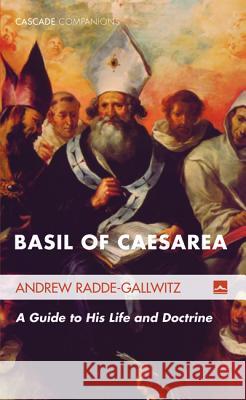Basil of Caesarea: A Guide to His Life and Doctrine » książka
Basil of Caesarea: A Guide to His Life and Doctrine
ISBN-13: 9781606081327 / Angielski / Miękka / 2012 / 178 str.
Basil of Caesarea: A Guide to His Life and Doctrine
ISBN-13: 9781606081327 / Angielski / Miękka / 2012 / 178 str.
(netto: 86,88 VAT: 5%)
Najniższa cena z 30 dni: 89,96
ok. 16-18 dni roboczych.
Darmowa dostawa!
Synopsis: Studying the early church can feel like entering a maze of bishops, emperors, councils, and arcane controversies. This book introduces early Christian theology by focusing on one particularly influential figure, Basil of Caesarea (ca. AD 330-378). It views Basil against the backdrop of a Roman Empire that was adopting Christianity. In Basil's day, Christians were looking for unity in the teaching and practice of their faith. This study acquaints the student with Basil's brilliant-and often neglected-theological writings. In particular, Saint Basil's reflections on the Trinity emerge from these pages as fascinating and illuminating testimonies to the faith of early Christians. Endorsements: "For decades, Basil's thought was overshadowed by the reputation of his brother, Gregory of Nyssa. But in recent years a new generation of scholarship-Volker Drecoll, Mark DelCogliano, Philip Rousseau, and Andrew Radde-Gallwtiz-has shown us anew the power of Basil as theologian . . . This concise and elegant discussion offers us the best short introduction to Basil available in any language." -Lewis Ayres, Bede Professor of Catholic Theology at Durham University "Basil of Caesarea's gifts as church politician and monastic founder have attracted much attention in recent scholarly literature, though his importance as a thinker and theologian had been neglected in favor of his younger brother, Gregory of Nyssa. In this clearly written book, Andrew Radde-Gallwitz helps us see Basil's brilliance as a theologian. Basil of Caesarea establishes Radde-Gallwitz as one of the finest scholars of Christian late antiquity." -Andrew Louth, Professor Emeritus of Patristic and Byzantine Studies at Durham University Author Biography: Andrew Radde-Gallwitz is Assistant Professor of Theology at Loyola University Chicago. He is the author of Basil of Caesarea, Gregory of Nyssa, and the Transformation of Divine Simplicity (Oxford University Press, 2009)."
Synopsis:Studying the early church can feel like entering a maze of bishops, emperors, councils, and arcane controversies. This book introduces early Christian theology by focusing on one particularly influential figure, Basil of Caesarea (ca. AD 330-378). It views Basil against the backdrop of a Roman Empire that was adopting Christianity. In Basils day, Christians were looking for unity in the teaching and practice of their faith. This study acquaints the student with Basils brilliant-and often neglected-theological writings. In particular, Saint Basils reflections on the Trinity emerge from these pages as fascinating and illuminating testimonies to the faith of early Christians. Endorsements:"For decades, Basils thought was overshadowed by the reputation of his brother, Gregory of Nyssa. But in recent years a new generation of scholarship-Völker Drecoll, Mark DelCogliano, Philip Rousseau, and Andrew Radde-Gallwtiz-has shown us anew the power of Basil as theologian . . . This concise and elegant discussion offers us the best short introduction to Basil available in any language."-Lewis Ayres, Bede Professor of Catholic Theology at Durham University"Basil of Caesareas gifts as church politician and monastic founder have attracted much attention in recent scholarly literature, though his importance as a thinker and theologian had been neglected in favor of his younger brother, Gregory of Nyssa. In this clearly written book, Andrew Radde-Gallwitz helps us see Basils brilliance as a theologian. Basil of Caesarea establishes Radde-Gallwitz as one of the finest scholars of Christian late antiquity."-Andrew Louth, Professor Emeritus of Patristic and Byzantine Studies at Durham University Author Biography:Andrew Radde-Gallwitz is Assistant Professor of Theology at Loyola University Chicago. He is the author of Basil of Caesarea, Gregory of Nyssa, and the Transformation of Divine Simplicity (Oxford University Press, 2009).











